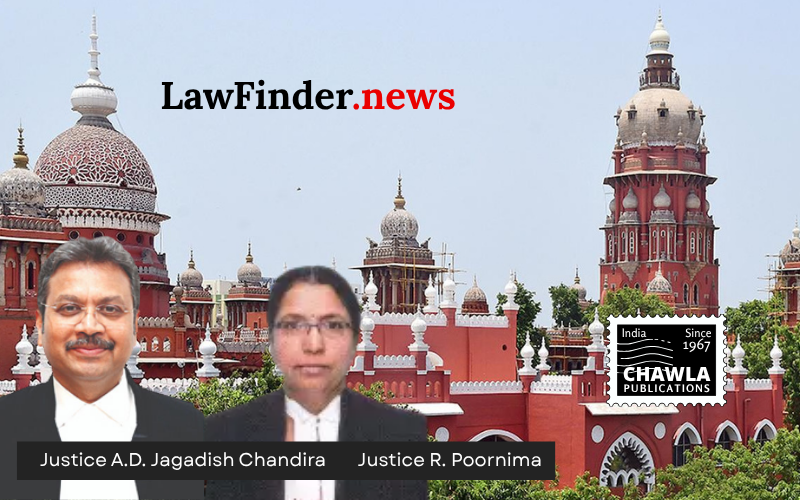The court criticizes reliance on non-substantive evidence and orders acquittal for lack of proof beyond reasonable doubt.
In a landmark judgment, the Madras High Court has acquitted Palraj, who was previously convicted under the Protection of Children from Sexual Offences (POCSO) Act, 2012, and Section 366 of the Indian Penal Code (IPC) by the Special Court for Exclusive Trial of Cases under the POCSO Act, Dindigul. The case, which revolved around charges of abduction and aggravated penetrative sexual assault, was overturned due to the reliance on non-substantive evidence by the trial court.
The judgment, delivered by Mr. A.D. Jagadish Chandira and Ms. R. Poornima, JJ., highlighted critical lapses in the trial process, emphasizing that conviction cannot be sustained solely on statements recorded under Sections 161 and 164 of the Criminal Procedure Code (Cr.P.C.) during the investigation. Such statements, the court underscored, are not substantive evidence and can only be used for limited purposes such as contradiction, not corroboration.
The case initially unfolded when the appellant was accused of abducting a minor girl and engaging in sexual assault. However, during the trial, the victim retracted her statements and did not support the prosecution's case, leading to her being declared hostile. The trial court had previously convicted the appellant based on statements made during the police investigation and entries made by the doctor in the accident register, which the High Court deemed inappropriate for establishing guilt.
Furthermore, the High Court criticized the trial court's reliance on a school certificate to establish the victim's age, noting that it failed to meet the requirements under Rule 12 of the Juvenile Justice Rules and Section 94 of the Juvenile Justice Act. Without proving the victim's age beyond reasonable doubt, the foundational facts required to invoke presumptions under Sections 29 and 30 of the POCSO Act were absent.
The High Court also pointed out the trial court's error in invoking presumptions under the POCSO Act without adequate evidence, thereby committing a grave legal misstep. In a stern remark, the High Court directed the Registry to send the trial judge for judicial training to ensure adherence to fundamental principles of criminal law.
Ultimately, the High Court's judgment emphasizes the necessity of substantive evidence for conviction, reinforcing the principle that legal processes must be robust and evidence-based. The acquittal underscores the judiciary's commitment to upholding justice and due process, ensuring that convictions are based on solid, corroborated evidence rather than assumptions or procedural inadequacies.
The decision to overturn the conviction not only liberates the appellant but also prompts a reevaluation of investigative and judicial practices, urging a meticulous approach to evidence handling and judicial decision-making.
Bottom Line:
Conviction based on statements recorded under Sections 161 and 164 of Cr.P.C. during investigation and reliance on the doctor's accident register entry is not sustainable as such statements are not substantive evidence.
Statutory provision(s): Indian Penal Code Section 366, Protection of Children from Sexual Offences (POCSO) Act, 2012 Sections 5(l) r/w 6, Prohibition of Child Marriage Act, 2006 Section 9, Evidence Act Section 80, Criminal Procedure Code Sections 161, 164(5), Juvenile Justice (Care and Protection of Children) Act, 2015 Section 94, Evidence Act Section 34.
Palraj v. Inspector of Police, (Madras)(Madurai Bench)(DB) : Law Finder Doc Id # 2776759




